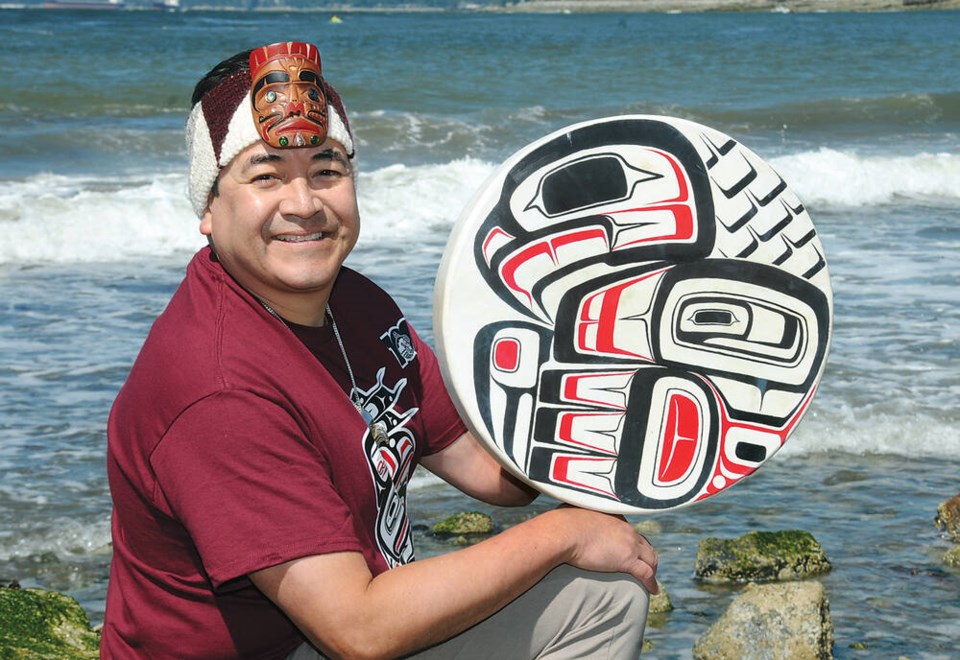As National Indigenous Peoples Day enters its 18th year, First Nations communities are taking a moment on June 21 to learn of and celebrate their unique culture and heritage – and are encouraging others to do the same.
“When we look at the Indigenous Peoples Day, I look at it as a day of celebration of who we are, and where we come from as Indigenous peoples, and embracing it,” said Sḵwx̱wú7mesh Úxwumixw (Squamish Nation) elected council member Sxwíxwtn (Wilson Williams).
For the general public, added Williams, it should be a day of education.”It’s a day of ‘Hey, can I be a part of this? How do I become a part of this, and really celebrate with you and honour you, and show that mutual respect?’” he said.
This year will mark the very first time the Squamish Nation will host its own event celebrating National Indigenous Day. Held at the Chief Joe Matthias Centre and open to the public, Williams encourages all to visit and immerse themselves in celebration.
“We’ve always been welcoming people,” he said.
“As long as people come in peace, we welcome you to the land and territory, and we can get to know each other by sharing a meal, enjoying the diversification of our cultures and celebrating that.”
The Tsleil-Waututh Nation will also be hosting a celebratory event, with dunk tanks, salmon dinners and a bouncy castle to be housed at its community administration building. The main aim of the event, said Chief Jen Thomas, is to encourage members to reconnect with their own culture.
So many members are only now returning back to Tsleil-Waututh Nation lands after a lifetime spent away, whether that be from marrying a non-Indigenous person, being taken as part of the Sixties Scoop or having been raised off reserve lands for other reasons.
“That’s been our focus for the last few years, just celebrating who we are, and teaching our membership who we are,” said Thomas. “We’re inviting a lot of members back to be a part of our family, and there’s a lot of reteaching that goes with that.”
The Squamish Nation have embarked on a similar mission to return its people home, and is currently developing a number of apartment complexes on X̱wemelch’stn (Capilano 5 reserve) to serve as safe, affordable housing.
“The people that are coming back are going to be hungry, especially our young people who are yearning to know who they are and where they come from, and are wanting to learn about their culture and ceremonies, language and teachings,” said Williams.
“This is a time of rejoicing as an Indigenous community, because it’s another day to be able to educate our young ones, and those who have been returned back home to their roots and are really embracing it.”
With Canada Day nearing as the next major public holiday, the impulse to champion Squamish Indigenous history and culture is only heightened further, said Williams. Like National Indigenous Peoples Day, it will still be a day of celebration, but it also encourages reflection on the country’s past and discussion on what its future will be.
“At a time when Canada was forming, Indigenous people were a nuisance and an inconvenience, and there’s a lot of lost history and lost stories of the lands and waters and resources that aren’t celebrated enough,” said Williams.
Now, the main focus is to acknowledge Canada’s “true identity,” said Williams, and what it truly means to be Canadian – which, essentially, can mean a myriad of different things.
“When we start embracing that more, it paves for a better tomorrow, because it creates a true culture to Canada and to the integration of Indigenous traditions and ways of being,” he said.
The hope for tomorrow, said Williams, is a true integration of Canada.
“A future where Indigenous people bring out the truth, bring out stories and help find solutions for a better tomorrow for another 150 years, but, mainly, to help celebrate the diversity and multiculturalism that is Canada.”
Mina Kerr-Lazenby is the North Shore News’ Indigenous and civic affairs reporter. This reporting beat is made possible by the Local Journalism Initiative.



